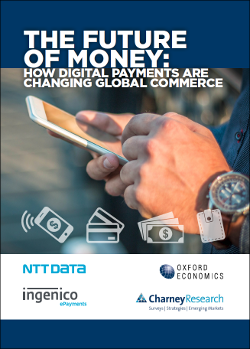Ungated Post | 24 Mar 2017
The Future of Money

As people grow ever more attached to their smart phones and tablets, electronic payment systems are bringing speed and safety to transactions while also cutting costs for merchants. Yet misconceptions about the technology have slowed its uptake. To explore attitudes toward mobile payments, Oxford Economics and Charney Research surveyed 2,000 consumers and 300 executives around the world in the fall of 2016. We found that companies underestimate consumers’ enthusiasm for mobile payments, and businesses must do more to address their customers’ security concerns.
Click here to read the report. Click here to view the infographic.
Oxford Economics’ team is expert at applying advanced economic tools that provide valuable insights into today’s most pressing business, financial, and policy issues.
To find out more about our capabilities, contact:
Americas
Diantha Redd
+1 (646) 503 3052
Email
Asia Pacific
Peter Suomi
+65 6850 0110
Email
EMEA
Aoife Pearson
+44 (0)203 910 8054
Email
Related Services

Post
KPMG M&A Outlook 2026: Between Uncertainty, Resilience, and Seizing Opportunities
Discover how Germany’s M&A landscape is evolving – with a focus on growth, AI and post-merger value creation.
Find Out More
Post
Silver, the next generation metal
This report highlights the critical role silver plays in data centres and artificial intelligence (AI), automotive and electric vehicles (EVs), and solar energy photovoltaics (PVs). With these sectors expected to expand significantly over the coming years, we expect future silver demand to be strong.
Find Out More
Post
Powering the UK Data Boom: The Nuclear Solution to the UK’s Data Centre Energy Crunch
The UK’s data centre sector is expanding rapidly as digitalisation, cloud computing, and artificial intelligence (AI) drive surging demand for high-performance computing infrastructure.
Find Out More